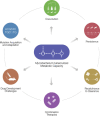Mycobacterium tuberculosis Metabolism
- PMID: 31350832
- PMCID: PMC10957194
- DOI: 10.1128/microbiolspec.GPP3-0067-2019
Mycobacterium tuberculosis Metabolism
Abstract
Mycobacterium tuberculosis is the cause of tuberculosis (TB), a disease which continues to overwhelm health systems in endemic regions despite the existence of effective combination chemotherapy and the widespread use of a neonatal anti-TB vaccine. For a professional pathogen, M. tuberculosis retains a surprisingly large proportion of the metabolic repertoire found in nonpathogenic mycobacteria with very different lifestyles. Moreover, evidence that additional functions were acquired during the early evolution of the M. tuberculosis complex suggests the organism has adapted (and augmented) the metabolic pathways of its environmental ancestor to persistence and propagation within its obligate human host. A better understanding of M. tuberculosis pathogenicity, however, requires the elucidation of metabolic functions under disease-relevant conditions, a challenge complicated by limited knowledge of the microenvironments occupied and nutrients accessed by bacilli during host infection, as well as the reliance in experimental mycobacteriology on a restricted number of experimental models with variable relevance to clinical disease. Here, we consider M. tuberculosis metabolism within the framework of an intimate host-pathogen coevolution. Focusing on recent advances in our understanding of mycobacterial metabolic function, we highlight unusual adaptations or departures from the better-characterized model intracellular pathogens. We also discuss the impact of these mycobacterial "innovations" on the susceptibility of M. tuberculosis to existing and experimental anti-TB drugs, as well as strategies for targeting metabolic pathways. Finally, we offer some perspectives on the key gaps in the current knowledge of fundamental mycobacterial metabolism and the lessons which might be learned from other systems.
Figures

References
Publication types
MeSH terms
Substances
Grants and funding
LinkOut - more resources
Full Text Sources
Other Literature Sources
Medical

